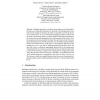Free Online Productivity Tools
i2Speak
i2Symbol
i2OCR
iTex2Img
iWeb2Print
iWeb2Shot
i2Type
iPdf2Split
iPdf2Merge
i2Bopomofo
i2Arabic
i2Style
i2Image
i2PDF
iLatex2Rtf
Sci2ools
ECSQARU
2001
Springer
2001
Springer
Social Choice, Merging, and Elections
Abstract. Intelligent agents have to be able to merge inputs received from different sources in a coherent and rational way. Recently, several proposals have been made for the merging of structures in which it is possible to encode the preferences of sources [5, 4, 12–14, 1]. Information merging has much in common with the goals of social choice theory: to define operations reflecting the preferences of a society from the individual preferences of the members of the society. Given this connection it seems reasonable to require that any framework for the merging of information has to provide satisfactory ways of dealing with the problems raised in social choice theory. In this paper we investigate the link between the merging of epistemic states and two important results in social choice theory. We show that Arrow’s well-known impossibility theorem [2] can be circumvented when the preferences of sources are represented in terms of epistemic states. This is achieved by providing a ...
| Added | 28 Jul 2010 |
| Updated | 28 Jul 2010 |
| Type | Conference |
| Year | 2001 |
| Where | ECSQARU |
| Authors | Thomas Andreas Meyer, Aditya Ghose, Samir Chopra |
Comments (0)

